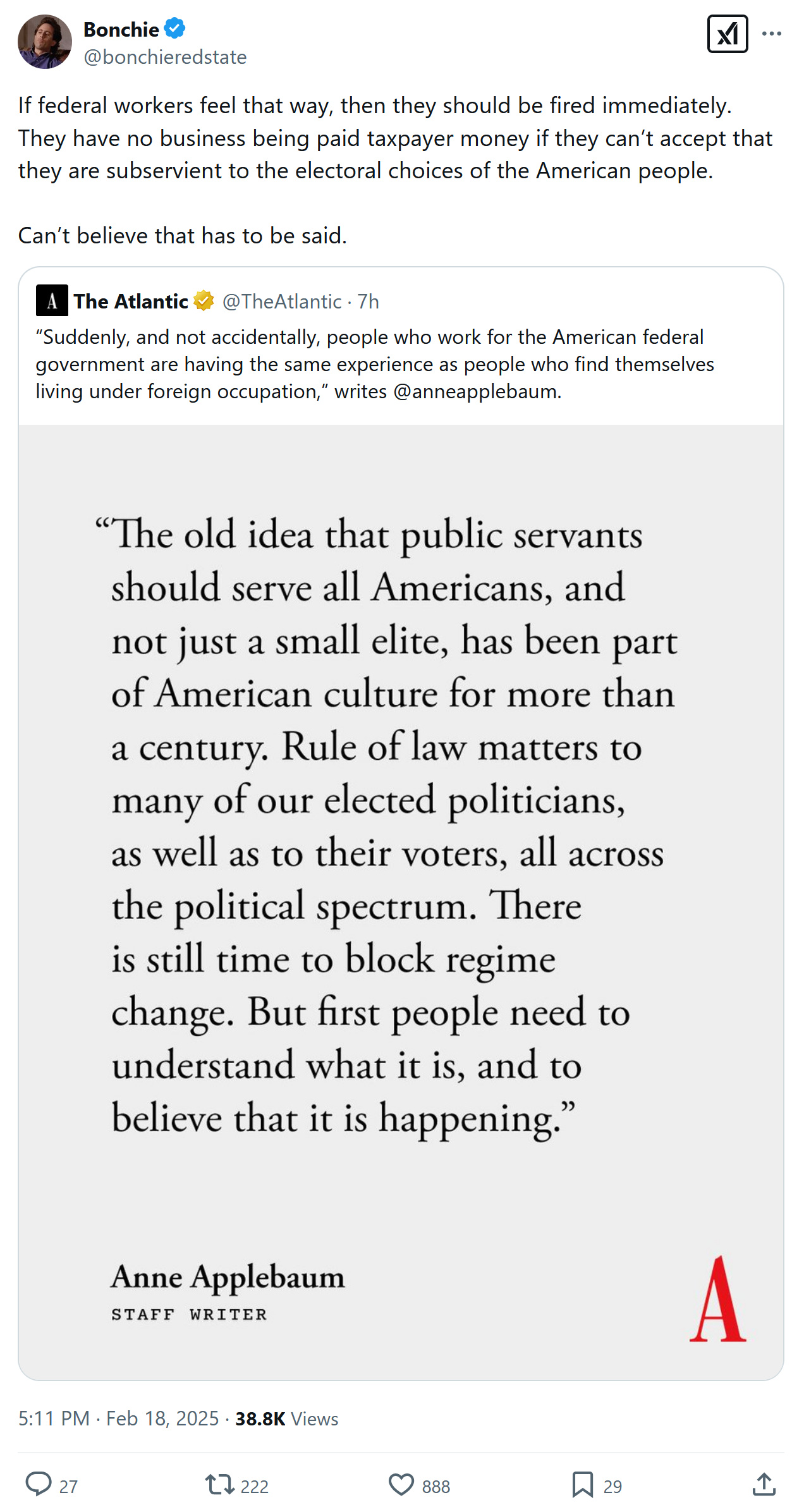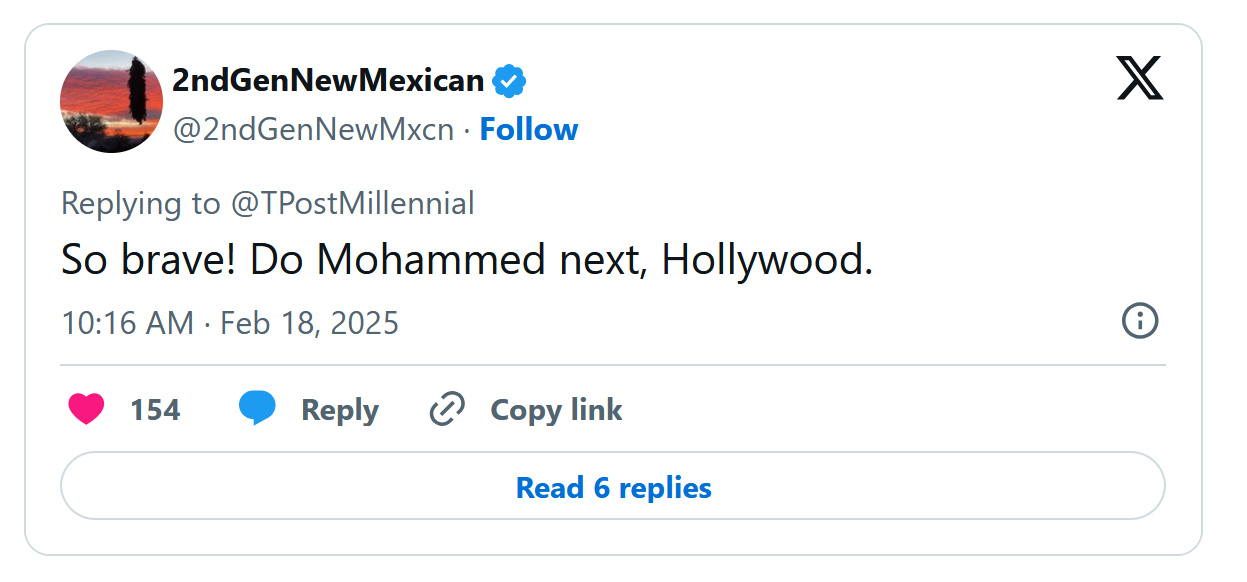AUTHOR OF GULAG NOW SIDING WITH THE NOMENKLATURA: There’s a Term for What Trump and Musk Are Doing.
Despite its name, the Department of Government Efficiency is not, so far, primarily interested in efficiency. DOGE and its boss, Elon Musk, have instead focused their activity on the eradication of the federal civil service, along with its culture and values, and its replacement with something different. In other words: regime change.
No one should be surprised or insulted by this phrase, because this is exactly what Trump and many who support him have long desired. During his 2024 campaign, Trump spoke of Election Day as “Liberation Day,” a moment when, in his words, “vermin” and “radical left lunatics” would be eliminated from public life. J. D. Vance has said that Trump should “fire every single mid-level bureaucrat, every civil servant in the administrative state, replace them with our people.” Steve Bannon prefers to talk about the “deconstruction of the administrative state,” but that amounts to the same thing.
These ideas are not original to Vance or Bannon: In the 21st century, elected leaders such as Hugo Chávez or Viktor Orbán have also used their democratic mandates for the same purpose. Chávez fired 19,000 employees of the state oil company; Orbán dismantled labor protections for the civil service. Trump, Musk, and Russell Vought, the newly appointed director of the Office of Management and Budget and architect of the Heritage Foundation’s Project 2025—the original regime-change blueprint—are now using IT operations, captured payments systems, secretive engineers, a blizzard of executive orders, and viral propaganda to achieve the same thing.
This appears to be DOGE’s true purpose. Although Trump and Musk insist they are fighting fraud, they have not yet provided evidence for their sweeping claims. Although they demand transparency, Musk conceals his own conflicts of interest. Although they do say they want efficiency, Musk has made no attempt to professionally audit or even understand many of the programs being cut. Although they say they want to cut costs, the programs they are attacking represent a tiny fraction of the U.S. budget. The only thing these policies will certainly do, and are clearly designed to do, is alter the behavior and values of the civil service. Suddenly, and not accidentally, people who work for the American federal government are having the same experience as people who find themselves living under foreign occupation.
Earlier today, Steve linked to “George MF Washington’s” Substack about the 1993 movie Dave, in which “Washington” wrote:
“Dave” (1993), and then later on “The American President” (1995) and “The West Wing” (1999) created a gauzy Federal fantasy land where Progressive Government was always and everywhere a force for good. Where all Americans aspired to a life beneath an all-powerful benevolent Government which did everything for us from birth to earth. In these movies, government never arrests you for speaking out at your local school board meeting. They don’t deny you disaster aid based on your political yard signs. And they never, ever, kick down your door and murder your pet squirrel. These movies built a world where the heroes were always coded Liberal, where they always did the right thing, and where screenplays written by prominent Hollywood Progressives ensured that Conservative-coded villains would always be frustrated by the ability of their opponents to tie them in rhetorical knots.
Most importantly, with the movies and TV shows of this era, Progressive Hollywood was telling us “this is how it ought to be… this is how Government should work.” But to watch “Dave” here in the post-Biden era… the era of Trump 2.0… is to realize that what Hollywood really did in the late-90’s, was to set a bunch of traps for itself and then gamely walk right into them thirty years later.
Now we’re up to 1996’s Wag the Dog, which began with a title card that read, “Why does the dog wag its tail? Because a dog is smarter than its tail. If the tail were smarter, it would wag the dog.”
Or to put it another way:
2025 will be the year of deciding who is in charge of Washington, the swamp dwellers, or the president.

Related: Continental Divide. Europeans are starting to realize that their governments are too big. Will Americans catch on next?
Throw your Euro stereotypes out the window: Last weekend, a Greek government that has cut public-sector pay and lowered pensions won a clear victory in local elections. Despite strikes and violence, despite the fact that Greece’s debt is still growing and more cuts are coming, there will be a Socialist mayor of Athens for the first time in 24 years. (And, yes, in Greece, the Socialists favor budget cuts, and the conservatives oppose them.)
Nor are the Greeks alone. Last month, voters re-elected a Latvian government that cut public-sector workers’ pay by 50 percent. The British government coalition, which is also trying to eliminate benefits and cut spending, remains strangely popular, too. Although—contrary to my previous observation—London witnessed its first Continental-style, anti-austerity riot last week, there wasn’t much general enthusiasm for the protesters. Some of their leaders wound up denouncing the riots, and they haven’t hurt the government’s poll numbers yet, either.
It’s saying too much to call it a pattern, and it may well not be a permanent change: I’m sure there are plenty of European politicians who won’t survive their next encounter with the voters. But there is something in the air. It almost seems as if at least a few Europeans have actually drawn some lessons from the recent recession and accompanying turbulence in the bond markets. They have realized, or are about to realize, that their state sectors are too big. They are about to discover that their public spending, which seemed justified in good economic times, has to be cut.
—Anne Applebaum, in the then-still Washington Post-owned Slate, November 15th, 2010.
I liked the that version of Applebaum. What happened in the years since, beyond TDS?




